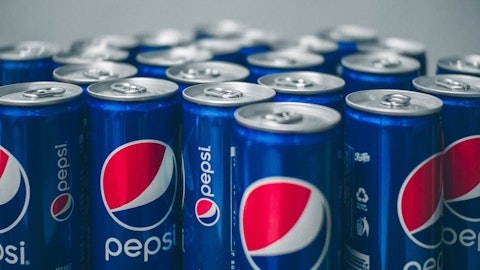PepsiCo Inc. isn’t the hottest growth stock in the market right now and is unlikely to become one in the recent future. The company’s previous acquisitions haven’t been able to add much value, and the recent acquisition of Siete Foods isn’t going to bring about any major change either.
With its growth in mature markets limited, and new products struggling to make any impact on the younger population, it is the 3.24% dividend yield that investors are looking at. The fact that the company has raised its dividend for over 50 years makes it a solid income stock.
PepsiCo Inc., a global powerhouse in the food and beverage industries, operates in over 200 countries. The beverage giant acquires its competitive edge through diverse product offerings covering both beverages and snacks, thus ensuring product diversification. The company is primarily concentrated in seven distinguished segments, namely PepsiCo Beverages North America, Frito-Lay North America, Quaker Foods North America, Europe, Africa, Middle East and South Asia (AMESA), Latin America, and Asia Pacific.

The core products of the company include brands like Pepsi, Mountain Dew, Gatorade, Lay’s, Cheetos, Doritos, and Quaker cereals. PepsiCo Beverages North America is recognized as the key contributor to revenue generation, accounting for over 60% of total revenue. Frito-Lay North America, the snack foods segment, not only generates 27% of the revenue but also boasts the highest operating profit margin at 42%.
From major retailers like Walmart to grocery chains all across the globe, PepsiCo expands its base by serving a wide clientele. The giant’s end markets not only include consumer retailers, particularly supermarkets and convenience stores, but also the food service sector, including cafes and restaurants, hence targeting consumers of all demographics desiring snacks and beverages.
The company’s stock is flat for the last two years. Investors simply aren’t willing to start paying a premium when the growth prospects are limited. However, the healthy dividend yield is keeping the stock afloat.
PepsiCo has now gone through multiple quarters of decreasing volumetric sales. Consumers aren’t willing to pay higher prices for PepsiCo products even though they are justified in the current inflation. This gives the company an interesting problem. Since it already has a world-class supply chain network, reaching almost every corner of the world to sell its product, its growth isn’t going to come from entering new markets. The growth is in price increases, and if the consumers aren’t willing to pay more, it severely dents the future prospects. Investors do not want to pay any premium for a stock that has limited growth.
Another avenue that growth could come from is acquisitions. But investors haven’t been impressed by value-destructive acquisitions so far. Even though the acquisition of Siete Foods gives the company a chance to expand in a high-margin business, the market isn’t very confident.
But proving the market wrong is where investors make money. If you’re willing to bet on PepsiCo’s recent acquisition, then the dividend safety provides the ideal comfort for you. Once the growth starts reflecting on the income statement, the stock could re-rate very quickly.
PepsiCo is not on our latest list of the 31 Most Popular Stocks Among Hedge Funds. As per our database, 65 hedge fund portfolios held PEP at the end of the second quarter which was 62 in the previous quarter. While we acknowledge the potential of PEP as a leading investment, our conviction lies in the belief that some AI stocks hold greater promise for delivering higher returns, and doing so within a shorter timeframe. If you are looking for an AI stock that is as promising as PEP but that trades at less than 5 times its earnings, check out our report about the cheapest AI stock.
READ NEXT: $30 Trillion Opportunity: 15 Best Humanoid Robot Stocks to Buy According to Morgan Stanley and Jim Cramer Says NVIDIA ‘Has Become A Wasteland’.
Disclosure: None. This article was originally published at Insider Monkey.





